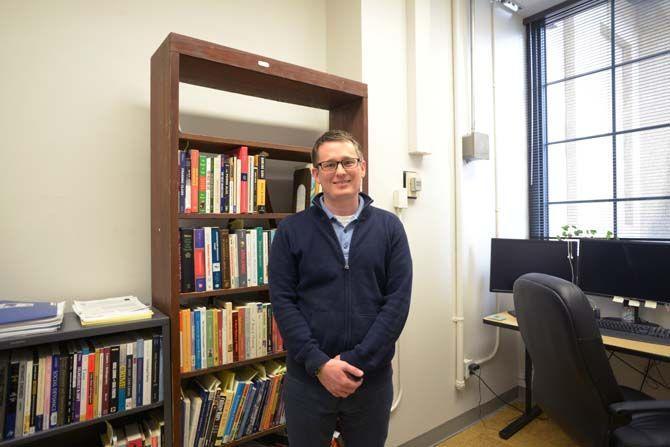Assistant sociology professor Samuel Stroope pores over data from almost 400 congregations and 100,000 churchgoers from all regions of the country.
His objective is not new.
Sociologists for centuries have tried to find out how religion affects a person’s place in society.
Others have found that people who attend church often are more likely to complete college. They have also found other fundamental and conservative beliefs negatively correlate with educational achievement.
Stroope’s research supports these findings, but it’s the information he added to religion’s sociological puzzle that earned him a place in the next edition of Sociological Perspectives.
The data Stroope looked over came from the Presbyterian Church (U.S.A.).
“PC(USA) has a huge research unit, and they collected the data in coordination with a bunch of other denominations around the country,” Stroope said. “So dozens of researchers around the country are using this huge expensive data set that they collected.”
Stroope and his team of two other researchers from Hope College and Baylor University focused on congregations of biblical literalists.
Biblical literalism is the theological view of the Bible as literal truth, instead of as an allegory or piece of literature.
Biblical literalism is not the same as innerancy, which deals with the truthfulness of the author’s intent, but instead accepts every line as law. For example, under the literal interpretation of the Bible, women are not permitted to teach men.
As the researchers expected, their findings showed a negative association between biblical literalism and college completion, as well as a negative relationship between literalist congregations and college achievements.
“[Biblical literalism] is related to a variety of outcomes such as obviously political affiliation and beliefs, moral attitudes, family behavior,” Stroope said. “Biblical literalists are more likely to marry earlier in life. They are less likely to have extra marital affairs. Then lower educational attainment is an outcome, and my findings supported that.”
But in addition to the anticipated outcomes, Stroope and his team found something else they weren’t expecting.
Stroope said his team expected to find that literalists in a literalist congregation would be less likely to attain education, but instead found people with those beliefs stayed constant no matter what setting.
“Literalists tended to have lower education regardless of what kind of church context they were in,” Stroope said. “We thought that the highly literalist congregation would kind of tap into the literalist beliefs of individuals and make them stronger, kind of reinforce them, but we didn’t really find that.”
Even those who did not identify as biblical literalists, but were part of a biblical literalists congregation, were less likely to complete college than nonliteralists in a nonliteralists congregation.
“What I found was that going above and beyond your own beliefs, being part of a congregation that was highly literalists, was also associated with lower educational attainment,” Stroope said.
He said the implications of his research were important in the age of a “knowledge economy.”
Even with high amounts of debt accumulated by some students, Stroope said college degree attainment affects everything from the kind of jobs available to life expectancy.
Professor’s study shows relationship between religion and education
February 5, 2015
Sociology Professor Sam Stroppe on Feb. 5, 2015 who is currently researching religion’s affects in academia.






